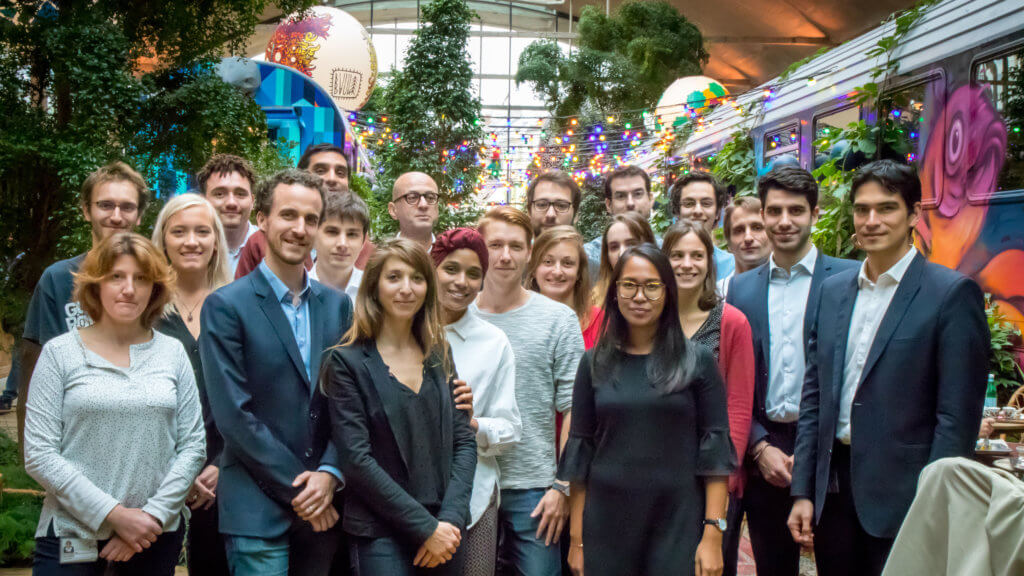How digital biomarkers can provide real-world evidence for clinical studies
Judith Hillen
The French startup Ad Scientiam has found a new way to assess the evolution of chronic diseases like Multiple Sclerosis: Using a mobile application, patients can easily check their condition at home. This can not only help individual patients and healthcare professionals to improve their treatment, but it also gives pharma companies the opportunity to evaluate the efficacy of new drugs and improve their clinical studies. In this interview with 5-HT, CEO and founder Liouma Tokitsu presents the idea of Ad Scientiam and talks about his vision of how digital biomarkers can change healthcare systems around the world.
 Ad Scientiam CEO and founder Liouma Tokitsu
Ad Scientiam CEO and founder Liouma TokitsuWhat is the problem about the way people with chronic diseases are treated today?
Today, data about the development of symptoms are mainly collected during infrequent consultations, from patients’ memories and clinical tests with known limits. For example, let’s look at Multiple Sclerosis (MS): Usually, the patient visits his neurologist only once or twice a year. The doctor asks, “How have you felt since our last appointment?”, and the patient has five minutes to explain one year of his life. This is very stressful and difficult. On the other side, the neurologist only has 10 to 15 minutes to assess the development of an individual patient. This is not enough time to evaluate aspects like vision or dexterity. Even for testing the walking ability, which is the most important aspect regarding MS, he would need half an hour.
What is the solution of Ad Scientiam?
We develop digital biomarkers for various chronic diseases which contribute to a better knowledge of the disease and the efficacy of specific medicine. Digital biomarkers are not based on biology, but on digital technology. If you look at a disease like MS, there are no biomarkers like those you can find in the blood when analyzing Diabetes. The only way to understand the patient’s condition is an examination by a neurologist which evaluates walking ability, dexterity, vision, and cognition. With our solution, we have digitalized this process, enabling the patient to do the assessment at home without his doctor, simply using his smartphone.
How is it possible to comprehensively assess a patient’s condition using only the smartphone?
For Multiple Sclerosis, we have developed the app MSCopilot which uses clinically validated software. In order to test his walking ability, the patient just puts his smartphone in his pocket and walks – built-in sensors measure distance and speed. If the patient wants to assess his dexterity, he has to move a ball on the display of his smartphone along a line that grows more and more complex. Exercises like this allow the patient to make a full assessment of his condition at home. Based on the results of the exercises, we employ a machine learning approach to extract a score that indicates the evolution of the disease.
How can not only individual patients and doctors, but also pharma companies benefit from solutions like MSCopilot?
The data collected by our applications can provide very important real-world evidence for pharma companies developing new drugs against MS. In their phase II and III clinical studies, pharma companies can use MSCopilot to analyze the efficacy of the new medicine. We have just entered into a scientific collaboration with the US-American biotech company Biogen to develop innovative digital solutions for clinical research in neurosciences, but we also cooperate with smaller companies developing drugs against MS. Because we have our own medical team, we are able to conduct clinical studies meeting the medical standards. Individual patients, who can use our service for free, can also decide to share their data – in anonymized or pseudonymized form – with research projects or pharma companies. This way, they can contribute to research and to the development of new drugs, which will eventually be useful for treating their own disease.
What is the story behind the foundation of Ad Scientiam and the development of MSCopilot?
Ad Scientiam was founded in 2013. At that time, the smartphone was changing different parts of society, but not yet the healthcare system. I have a background in software engineering, and my idea was to take advantage of these new technologies and use them for improving the healthcare system. So, I went to the Hôpitaux Universitaires Pitié Salpêtrière, a large hospital in Paris, and presented my idea to various doctors and researchers. They gave me the opportunity to create my company with offices both in the hospital and in a startup incubator located only a few minutes away. This means, Ad Scientiam is both located in a clinical ecosystem and in an ecosystem of tech startups. This is a great environment for the development of our medical applications. MSCopilot was cocreated with the support of a scientific board and the most important patient’s association of France. In order to validate our product, we conducted clinical studies in eleven hospitals, involving 220 subjects. Every day, we work together with patients and healthcare professionals to understand their problems and needs.
 Ad Scientiam Team
Ad Scientiam TeamBesides MS, what other diseases do you address or are you planning to address in future?
Our first field of action are other neurologic diseases affecting motoric abilities, like Parkinson, which is very similar to MS. Another project deals with depression: By analyzing the voice, we try to predict how a patient reacts to a given treatment. At the moment, you have to wait for weeks to see if a new drug works on a patient – we want to reduce this time period to one week. Apart from that, we also have programs for rheumatology and cardiology. The first thing we do when we start looking at a new disease is to forget everything we thought to know – we start again from a white page, always in a cocreation process with patients and healthcare professionals.
What are your next steps concerning MSCopilot?
Currently, we are working on improving our pilot version and demonstrating its value for the healthcare system. In 2021, we will start a longitudinal clinical study in order to get medical proof. We are also looking for hospitals and patients’ associations in Germany who are interested in collaborating with us for the further development of MSCopilot.
What is your vision for the future of Ad Scientiam and the healthcare system?
Our goal is to make MSCopilot the new standard to assess the condition of patients with Multiple Sclerosis. Our overall goal is to have digital biomarkers widely recognized by drug administration authorities. I think in ten years it will be very basic to talk about digital biomarkers and the digitalization of healthcare systems in general. With Ad Scientiam, we want to accelerate this movement and become the leader in this field.
5-HT Chemistry & Health Newsletter
Want the latest tech and industry news, events, relevant info from the ecosystem and more?
Subscribe to 5-HT Newsletter now Subscribe to 5-HT Newsletter now
Become part of the 5-HT Chemistry & Health
Exchange ideas with innovative startups and future-oriented companies in our ecosystem. We look forward to meeting you!